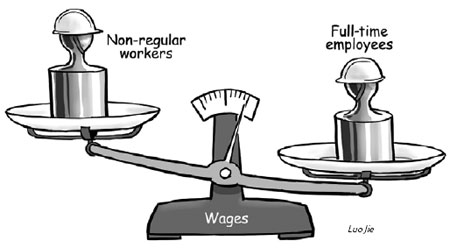
|
OPINION> Commentary
 |
|
Part-timers too deserve a work-life balance
By Miki Kobayashi (China Daily)
Updated: 2008-11-07 07:45 All working people need to strike a good balance between work and personal life. The idea is a recent concept in Japan, leading pundits to create the acronym WLB - work-life balance - to describe it. WLB is an especially hot topic among corporate management, labor unions and government officials. In December 2007, the government adopted its WLB Charter. This aims at a society where people (1) can reach financial independence through employment; (2) have enough private time to lead healthy and affluent lives; and (3) choose from diverse working and living styles. The charter also set up numerical targets, including a national percentage of telecommuters - people who work from home via networked computers - and for workers taking child-care leave. Yet as things stand, the proposed policies focus mostly on regular full-time employees - who already benefit more than non-regular part-time or temporary workers. In particular, the proposals basically ignore the plight of young non-regular workers, who graduated during the years of job scarcity after the collapse of the asset-inflated economy in the early 1990s and could not land regular jobs. Many of those young people often must work long hours with few such benefits. The whole situation alienates these workers, leaving them to conclude that work-life balance is something only for other people. No wonder many feel antipathy toward these proposals. I often hear of examples of young people whose balance between work and personal life is a far cry from the ideals proposed by the government. In the welfare and medical sectors, workplaces are understaffed and employees overworked. In one case I know of, a young pregnant nursing caregiver suffered a miscarriage after she was required to work long hours late at night. The woman, in her 20s, was nearly in tears as she told me: "I applied for exemption from the night shift but my request was turned down. I had a miscarriage when the shift ended." Such tragic work-related miscarriages are also common among shop attendants and beauticians, who must stay on their feet nearly all day. The balance between their work and personal lives for such women as these is so poor that for them, the first letter of WLB could stand for wages. They are sacrificing their personal lives to earn enough to survive. For them, there is no "balance" involved. Across the nation, many non-regular employees who earn 3 million yen ($30,678) a year or less must work long hours to earn enough to make ends meet. Most are overworked. That's partly because at companies where the management takes steps to improve the work-life balance of full-time employees, often non-regular and temporary employees are forced to pick up the slack. At a well-known precision machinery maker that boasted of implementing "no-overtime days", dispatch workers and subcontractors' staffers were left doing all the overtime work at its factories after the full-time employees quit for the day. Another problem is that non-regular employees are in many cases ineligible to join the in-house labor unions for full-timers, which negotiate WLB benefits with management. A labor union official let the cat out of the bag: "We don't want outside labor unions (to which non-regular employees belong) to interfere, make a court case or bring the matter to collective bargaining." After all, companies use non-regular workers to cut personnel expenses. So they won't raise pay rates for nonregular workers or change their status to full-time employees. Labor unions, on the other hand, fear that improved working conditions for nonregular employees could lead to wage cuts for their full-time employees. To get around such problems, I offer a few proposals. First, discrimination in wages and working conditions between full-time and nonregular employees should be banned without delay. All employees should be treated equally under the law, regardless of their type of employment.  While the WLB concept is modeled on Scandinavian examples, in reality, Japan lags far behind its mentors when it comes to equal treatment. Japan must ratify the International Labor Organization's Part-Time Work Convention of 1994, which protects the rights of non-regular workers. Meanwhile, the government's revised part-time labor law, which took effect in April, is far from adequate. Not only does it lack the power to force companies to improve wages and working conditions for part-time workers, the scope of workers it covers is too narrow. Because of its strict requirements, for example, the law does not apply to part-time workers who work as many hours or more than full-time employees. Such points need to be rectified. In addition, the set minimum wages for all workers and wage levels for dispatch workers must be increased if equality is to be achieved. Then, and only then, will people stuck on the bottom rung of the employment ladder achieve work-life balance. WLB would then no longer be a special privilege for full-time employees. If a company ever emerges that is such a model employer, I hope to be the first to report on it. The Asahi Shimbun (China Daily 11/07/2008 page9) |